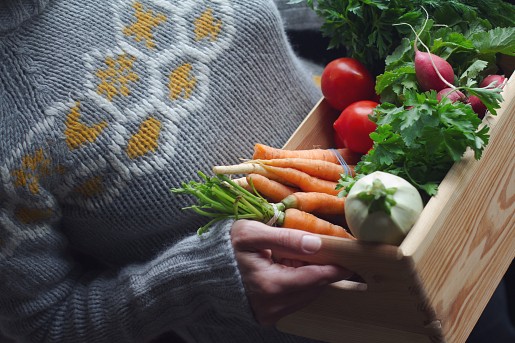Make Your Garden Work This Fall and Winter
 The days feel like they're getting shorter by the minute (which, technically, they are), and the garden seems to be backsliding into laziness; with the exception of some squash, most of the beds are empty and crops are living out the last of their days. Does that really mean you have to spend the next four to six months buying produce from the store? Nope. There are tons of things you can grow in fall and winter to keep up a source of fresh, homegrown goodies.
The days feel like they're getting shorter by the minute (which, technically, they are), and the garden seems to be backsliding into laziness; with the exception of some squash, most of the beds are empty and crops are living out the last of their days. Does that really mean you have to spend the next four to six months buying produce from the store? Nope. There are tons of things you can grow in fall and winter to keep up a source of fresh, homegrown goodies.
Kale
Okay, I get it, kale is so trendy as to have reached social saturation point. But...give kale another shot, okay? For one thing, there are lots of different kale cultivars you might want to experiment with in your garden. It's also rich in vitamins and minerals, and it's a very robust winter crop, thriving in a variety of conditions. And guess what? Redbor kale, kamome red kale, and some others walk the tightrope between edible and ornamental; so you can get color in your garden and have a snack food!
Winter Lettuce
Lettuce can be grown at almost any time of the year, including winter. You'll need a cold frame, greenhouse, or warm area of the house with some sunlight if you live in a snowy area, but otherwise, have at it with cold-hardy varietals that like the winter months. When limited fresh produce is available, being able to pick your own crisp, crunchy lettuce is a wonderful thing.
Herbs
If you're not growing your own herbs yet, you should be. They'll grow indoors, in windowboxes, on porches, and of course in the garden itself. Best of all, they're cold-hardy and produce year-round. Plant some thyme, rosemary, sage, tarragon, oregano, and other herbs to get them established and producing fresh seasonings for you! Things like chives and parsley can be grown through the spring and summer, and you can always cut and dry them for winter use.
Spinach and Orach
These related greens taste great and love winter weather. Orach is a rich maroon color, so it will provide a colorful splash in your winter garden (along with that red kale you planted). In fact, you might enjoy the look so much that you'll hire a handyman to build you some planters so you can grow it as an ornamental and an edible. Like lettuces, they can be harvested a few leaves at a time to keep the plant producing for weeks.
Kohlrabi
This plant produces flavorful leaves, and a nice root, to boot! You can grow it in cold weather, and it tends to mature extremely rapidly; once the root is big enough, you can pickle it, use it in stir-fries, eat it raw on salads, and more. You might as well sow some closely-related radishes while you're at it!
Potatoes
Here's a little secret: potatoes are really not very fussy. You can toss them in a five-gallon bucket with soil or straw as a growing medium and keep them producing all winter; when it gets cold and the weather is bad, just move them indoors or to a sheltered area on the porch. When the weather is sunny and more temperate, move them back outdoors again.
You'll have a tough time growing delicate summer crops like corn, thin-skinned squash, tomatoes, strawberries, and so forth without a commercial greenhouse and a willingness to spend a lot of money on heating and lighting to force your garden to grow, but the winter doesn't have to be grim by any means. (And remember, you can use drying and canning to preserve summer crops for winter eating!)
You'll want to make sure that your soil is very rich and well-amended, and that your plants are insulated. If you have a greenhouse, great. You can also make a cloche or makeshift greenhouse with old windows, hoops of PVC pipe with greenhouse plastic strung over them, or even milk jugs cut open to slide over growing plants to protect them from the cold. You may also want to check with your plumber about protecting your irrigation supply so the pipes don't freeze in the winter.
It doesn't take much to provide enough shelter for plants to thrive in your winter garden, and you'll be glad you have them when you see the depressing produce offerings at the store!
Looking for a Pro? Call us (866) 441-6648

Landscaping Average Costs
Landscapers Experiences

Yard Cleanup And Lawn Care Service With A Great Work Ethic

Tree Removal For The Last Part Of A Poor Old Mulberry



